- Home
- David Gemmell
Shield of Thunder t-2 Page 8
Shield of Thunder t-2 Read online
Page 8
“You know very well what the difference is,” Bias hissed. “The two Mykene will vanish away, join some foreign garrison, and no one will be the wiser. The girl is the sister of Achilles. Achilles the Slayer, the Blood Drinker, the Disemboweler. When she is captured—and she will be captured, Odysseus—the word will go out that the Penelope was involved in her escape. You want Achilles hunting you? There is no more famous killer in the lands of the west.”
Odysseus laughed softly. “So your argument is that we can be heroic when there is little chance of discovery, but if there is real risk, we should be craven?”
Now it was Bias who sighed. “It doesn’t matter what I say. Your mind is set.”
“Yes, it is. Understand this, though, my friend. I agree with everything you’ve said.”
“Then why risk it?”
Odysseus fell silent for a moment. “Perhaps because there is a story here, Bias. And I do not mean some tale to be told on a moonlit beach. This is a thread in a great tapestry. Perhaps I want to see the weave complete. Think of it. A royal priestess flees the Temple of the Horse and is captured by pirates. Two of those pirates turn on their companions and risk their lives to save her. Then we happen along. Now, the Great Green is massive. What are the odds that she would end up on a ship captained by a king who recognizes her? And where is she heading? To the Golden City, where all the kings of west and east are gathering. Into a city seething with schemes, plots, and dreams of plunder.”
“And Achilles will be there,” Bias pointed out.
“Oh, yes. How could he stay away? Hektor and Achilles, two giants of battle, two legends, two heroes. Pride and vanity will drive Achilles to Troy. He will hope that Hektor chooses to take part in his own wedding games. He will dream of bringing him low so that men will talk of only one great hero.”
“So we are to sail into Troy bearing the renegade sister of Achilles? And what will she do there? Wander the streets until someone recognizes her?”
Odysseus shook his head. “I believe she will seek out another former priestess of Thera, a friend.”
Realization dawned on Bias. “You are talking of Andromache?”
“Yes.”
“Achilles’ runaway sister will go to Hektor’s betrothed?”
“Yes. Now can you see what I mean about the thread and the tapestry?”
“I don’t care about threads,” Bias said with feeling. “However, the crew must not learn her identity.”
“She will not tell them. And the less they know, the more content they will be.”
“I would have been more content not knowing,” Bias said angrily.
Odysseus grinned. “Still think you know me better than I know myself?”
Bias was silent for a while, and when he spoke, Odysseus heard the sadness in his voice. “Oh, there is nothing in this that does not match what I know of you, Odysseus. The man I truly did not know was myself.”
“I think we never really know ourselves,” Odysseus said with a deep sigh. “I used to be the Sacker of Cities, a slave trader and a reaver. I thought I was content. Then I became the trader, the man with no enemies. And I think I am content. I was wrong then; am I wrong now?” He looked at Bias. “Sometimes I think that the more I learn, the less I know.”
“Well, I am more content serving the man with no enemies,” said Bias.
They sat in silence for a while. Finally Odysseus rose. “I still dream of him, you know,” he said. “I still hear his laughter.”
Sadness flowed over Bias as he watched the Ugly King wander away.
I still dream of him, you know. I still hear his laughter.
Fourteen summers had drifted by since those dreadful days of death and despair, but for Bias the memory remained, harsh and bright and painful.
During a slave raid on a foreign village Bias had been struck on the left forearm by a club. The bone had snapped and was long in the healing. Still, they had captured eighteen women and set sail for the slave markets of Kypros. The slaves had remained silent during the voyage, sitting huddled in the center of the deck. But when they had arrived at the island, one of them, a tall woman with fierce dark eyes, had stared malevolently at Odysseus.
“Bask in your triumph, Sacker of Cities,” she had said. “Yet know this: Before this season ends you will know the same anguish we suffer. Your heart will be sundered, your soul bathed in fire.”
Odysseus had shaken his head. “You ungrateful bitch,” he had said. “Were you raped? Were you beaten? Have I not seen you all fed and looked after? You will all be as well off on Kypros as you were in that lice-infested village.”
“And who will give us back the husbands you slew, the children you left behind? The curse of Set sits upon your shoulders, Odysseus. Remember my words when the days shorten.”
Two more succesful raids had been made before the Penelope and the three other ships returned to Ithaka. Bias had been left there while his broken arm mended. Odysseus had spent three days with Penelope and his son, the six-year-old Laertes, and then had sailed on one more plunder raid.
Toward season’s end Penelope told Bias she was going to Pylos with Laertes. Nestor had invited them to one of his sons’ marriage celebrations. Bias had traveled with her on the short voyage east.
The first three days had been massively enjoyable. Bias had been popular with the female slaves at Nestor’s palace. One night two of them had shared his bed, one blond and big-breasted, the other dark with huge eyes. It was a fine night. Toward dawn they heard wailing coming from the palace.
Bias did not know it then, or even sense it through his joy, but the wailing heralded the days of death.
Plague had broken out ten days earlier in a village close by. King Nestor had ordered soldiers to quarantine the place, allowing no one out. Later it transpired that a soldier had smuggled his sister from the village, and she had come to the palace. By the fourth day of her visit several slaves had shown the first symptoms: fever and swellings in the armpits and groin. Within days the plague was rife.
The sick were taken to the stricken village and placed in a large house owned by the merchant who supervised the flax gathering in the area. He had been the first to die. The villa became known then as the Plague House. Bias had been terrified. Apart from the broken arm he had never been sick in his life, and he dreaded the thought of incapacity almost more than death itself.
Then the child Laertes fell ill. Penelope insisted on traveling with him to the Plague House. Bias felt like a coward, for he did not offer to go with her. He might just as well have. Two more nights went by, and he woke with a dry throat, sweat streaming from his body.
At first he tried to hide the symptoms, but the slave girl sharing his bed told her mistress, and soldiers came to escort Bias from the palace with several others who had fallen sick.
By the time the wagon reached the Plague House, Bias was delirious, and he remembered little of the next few days save that his body was racked by terrible pain and his dreams were of fire-breathing monsters whose burning breath blistered his flesh. But he was strong, and he survived the fever and the pus-filled cysts that burst the skin of his armpits and groin. Penelope came to his bedside often during the following days, bringing him broths and clear, cool water to drink. She looked weary, for she was working tirelessly with three priests of Asklepios. More people were being brought in every day, and now many of the houses in the village were filled with fresh victims of the plague. Death was everywhere, and the screams of the dying echoed throughout the settlement. The sickness killed four in every five of those who contracted it.
Then Penelope fell ill. Bias carried her to the wide bed in which her little boy lay and placed her beside him. Laertes had slept for the previous two days, unable to be roused even to drink cool water.
By the tenth day two of the three priests had also fallen ill. Now only the few survivors tended the victims. Bias left the house one morning and called out to the soldiers who were guarding the fence that had been erected around
the settlement, telling them that more help was needed inside. That afternoon four elderly priestesses of Artemis arrived with the food wagon. They were stern-eyed, unfriendly women who took charge with brisk efficiency. They directed Bias and three other male survivors to gather all the bodies and move them to open ground, where a pit was dug and filled with oil and brushwood. There the corpses were burned.
Bias recalled the bright morning when Odysseus had appeared at the fence, shouting out for Penelope.
Bias left the house and saw his king standing at the perimeter, a cape of green upon his broad shoulders, the sunlight glinting on his red beard.
“Where are they, Bias?” he called out. “Where is my wife, my son?”
“They are sick, my lord. You must stay clear of this place.”
Bias already knew that Odysseus, fearless in battle or storm, was terrified of sickness. His own father had died of the plague. So he was surprised on that day when Odysseus walked to the makeshift gate and lifted the leather latch. Soldiers surrounded him, grabbing his arms and hauling him back. Odysseus lashed out, sending one man spinning from his feet. “I am Odysseus, king of Ithaka,” he thundered. “The next man who lays hands on me will have that hand cut off!” They fell back then, and Odysseus opened the gate and strode in.
Together they had entered the house. Odysseus had faltered then as he saw the scores of plague victims laid out in the megaron. The air was foul with the stench of vomit, excrement, and urine. Bias had led his king to an upper bedroom where Penelope lay, Laertes alongside her. Odysseus had slumped down beside them, taking Penelope’s hand and lifting it to his lips.
“I am here, my love,” he said. “The Ugly One is by your side.” Then he stroked his son’s face. “Be strong, Laertes. Come back to me.”
But Laertes had died that night. Bias had been there. Odysseus had wept, his body shaking. He had hugged the dead child to his chest, his huge hands cradling the boy’s head. Bias had seen Odysseus hug the boy many times. Laertes would laugh happily and kiss his father’s bearded cheek. At other times he would giggle helplessly as Odysseus tickled him. Now the child was utterly still, his face as pale as marble. After a long while Odysseus fell silent. Then he looked up at Bias. “I brought this doom upon them,” he said.
“No, my king. You did not bring the plague.”
“You heard the slave woman. She cursed me. Said I would know the same anguish she had suffered.”
At that moment Penelope gave a soft groan. Odysseus gently laid his son back on the bed and moved to Penelope’s side. He leaned over her, brushing the sweat-drenched hair from her glistening brow. “Don’t leave me, girl. Hear my voice. Stay with me.”
And there he had remained for three days, bathing her fevered body with warmed water, changing the soiled bed linen, holding her to him, talking to her constantly though she could not hear him. On the morning of the fourth day her cysts burst, her body expelling the poisons. One of the priestesses of Artemis came to see her.
“She will live,” she announced, then left the room.
Fewer and fewer people were brought to the settlement over the next weeks. The survival rate began to rise.
Autumn rains began the day Odysseus, Penelope, and Bias left the settlement. As they walked along a cliff path toward Nestor’s palace, sunshine briefly speared through the thick gray clouds. Bias looked at his king. In the sunlight he saw the touches of gray at his temples, the weariness in his eyes.
Odysseus never spoke of the curse again. But that was the last summer the ships of Ithaka embarked on slave raids. Odysseus, the Sacker of Cities, the reaver, the pirate, became Odysseus the trader, the storyteller.
Bias lay back on the sand and stared up at the stars. In that moment he, too, remembered the laughter of Laertes. The boy would have been twenty now and a man, handsome and strong.
Yet his death had brought fourteen years of peaceful trading from Odysseus. How many villages would have been raided in that time? How many wives torn from their homes to be sold into slavery? How many fathers cut down in front of their families? The thought surprised him, and he cursed softly. Glancing across the campsite, he could see Odysseus sleeping soundly.
Why did you have to talk about threads and tapestries? Now I can’t sleep!
CHAPTER SIX
THE THREE KINGS
Kalliades was sitting staring out over the mist-shrouded sea. There was something sinister about the shimmering white wall and the smokelike tendrils drifting over the dark, half-submerged rocks. He shivered, drawing his cloak more tightly about him. Easy to believe legends about sea monsters and demons of the deep when you gazed upon such a mist. Anything could be hidden there, watching the sleeping men on the beach. Thinking such thoughts made him remember his childhood, when he had sat at the gathering fire listening to the bard tell terrifying stories of night creatures who crept into houses and ate the hearts of the young. He had both loved and hated those stories—loved them while he sat with the other children and hated them when he was alone later, listening for the soft footfalls of the night beasts. Many of the tales had involved magical mists that covered the movements of demons.
Kalliades suddenly smiled. “You are not a frightened child any longer,” he told himself aloud. Then the smile faded.
He had been six years old when the reavers had attacked the village, setting houses aflame, killing the men, and dragging out the younger women. His fourteen-year-old sister, Agasta, had grabbed him, and they had tried to flee. She had hidden him in a flax field. Then strong men had caught her. He remembered the look on Agasta’s face: desperation, fear, and anguish. She had fought them, scratching and biting as they raped her. In their fury at her resistance they had cut her throat. Kalliades had lain there watching the blood gush out.
Seeking to shut out the memory, Kalliades glanced up to where Piria was sitting beside her small fire. As a child he had been powerless to save his sister. As a man he had at least prevented a similar tragedy. Was there some small comfort in that?
A sound cut through his thoughts. Swinging back toward the mist, he heard it again, a strange creaking groan. Then he heard muted shouts. The mist parted briefly, and for a moment he saw a mast, canted at an odd angle, and the briefest vision of a hull. No sailors chose to spend the night at sea. Journeys upon the Great Green were dangerous enough without the added risk of blindly rowing in the dark, unable to see the reefs or sunken rocks.
Kalliades called out to the men around the campfire, and Odysseus, Bias, and the rest of the crew moved out to the sea line. The wallowing ship was swallowed by the mist once more.
“Many of her oars have gone,” Bias said. “Looks like she’s sinking.”
No one moved. They stood in a ragged line, staring out at the wall of mist. Then the stricken vessel appeared again, this time broadside on. In the moonlight they could all see the painted bull’s head on the prow.
Odysseus swore colorfully. “That’s Meriones’ ship,” he said. “By the gods, don’t just stand there, you cowsons. I have a friend in trouble.”
Instantly the crew ran to the beached Penelope, pushing her out, then swarming aboard. Kalliades and Banokles would have gone with them, but Odysseus, the last man to scramble onto the deck, called back to them to stay on the beach. “Set some signal fires,” he said. “Likely we’ll need some light to guide us back in.”
Odysseus ran to the foredeck and climbed to stand on the prow. The mist was so thick that he could not see the rear deck or the figure of Bias at the steering oar. Even the sound of the oars dipping into the water was muffled and distant. He heard Bias calling out a slow beat, his voice muted and distorted by the fog.
Glancing to his left, Odysseus stared hard at the shimmering mist. Somewhere close, though invisible now, was a sheer wall of rock rising from the sea. The blond giant Leukon was the lead rower on the port side. Odysseus called out to him: “Stay watchful. Remember the cliff.” They were not moving fast enough for a collision to damage the Penelope. The danger w
as to the oars.
The Penelope’s hull creaked and groaned as the ship scraped slowly against a line of submerged rocks. “Steady, lads!” Odysseus shouted. “Lightly now!”
He was tired, his eyes gritty, his muscles aching and bruised from the rescue of Ganny. Sucking in a deep breath, he squinted into the mist. “Can you hear me, Meriones?” he bellowed.
There was no reply, and he called out several times more. A sailor appeared alongside him, a heavy rope looped over his shoulder. Then the Penelope began to vibrate. Odysseus swore loudly as another earthquake shivered the sea. The water began to roil. The Penelope swung sharply as the undertow took her, then suddenly pitched to port. Odysseus lost his hold on the high prow and started to fall. The crewman with the rope grabbed him, hauling him back to the deck. A large wave lifted the ship, and the Penelope tilted sharply to starboard. Two of the rowers were thrown from their benches.
Odysseus scrambled back onto the prow. Bias was calling out urgent orders to the men, and the ship steadied. But they had been pushed back toward the cliff. It loomed out of the mist, huge and dark. Rocks began to fall into the sea, sending up great splashes all around them. Odysseus looked up. High above the Penelope was a massive overhang, almost as long as the Penelope’s keel. A large crack had appeared in it. The wind picked up, lashing the sea against the ship, driving it back toward the black wall.
“Row hard, you cowsons!” Odysseus shouted. The oars bit deeply into the heaving water, but against the power of the incoming waves the rowers were struggling just to prevent the Penelope from being dashed against the cliff.
A sickening groan sounded from the rock face above. Dust and rock shards tumbled down from the widening crack in the overhang, striking the deck of the Penelope like hailstones.
“Ramming speed!” Odysseus bellowed. There was no ram on the Penelope, but all the sailors knew what he meant. With all their strength they hauled on the oars. Bias took up the fast beat.

 Bloodstone
Bloodstone White Wolf
White Wolf Wolf in Shadow
Wolf in Shadow Last Sword of Power
Last Sword of Power Dark Moon
Dark Moon Hero in the Shadows
Hero in the Shadows Gemmell, David - Drenai 09 - Hero In The Shadows
Gemmell, David - Drenai 09 - Hero In The Shadows Waylander
Waylander Shield of Thunder
Shield of Thunder Stormrider Stormrider
Stormrider Stormrider Ghost King
Ghost King Legend
Legend Winter Warriors
Winter Warriors Fall of Kings
Fall of Kings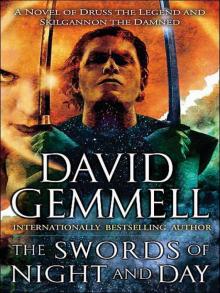 The Swords of Night and Day
The Swords of Night and Day The King Beyond the Gate
The King Beyond the Gate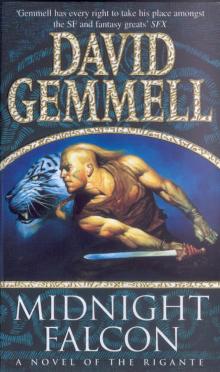 Midnight Falcon
Midnight Falcon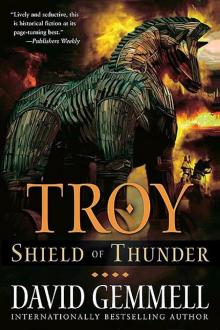 02 - Shield of Thunder
02 - Shield of Thunder In the Realm of the Wolf
In the Realm of the Wolf Ravenheart
Ravenheart The First Chronicles of Druss the Legend
The First Chronicles of Druss the Legend Last Guardian
Last Guardian Stormrider
Stormrider The Hawk Eternal
The Hawk Eternal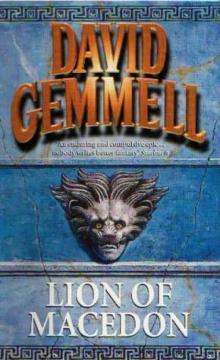 Lion of Macedon
Lion of Macedon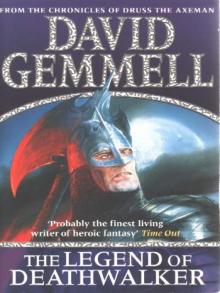 The Legend of Deathwalker
The Legend of Deathwalker Knights of Dark Renown
Knights of Dark Renown Echoes of the Great Song
Echoes of the Great Song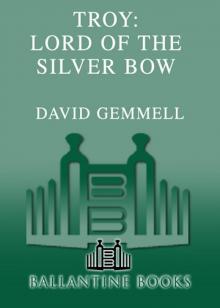 Lord of the Silver Bow
Lord of the Silver Bow Quest for Lost Heroes
Quest for Lost Heroes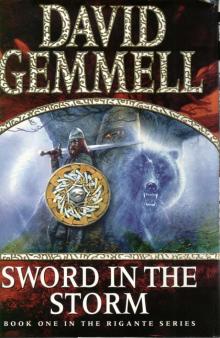 Sword in the Storm
Sword in the Storm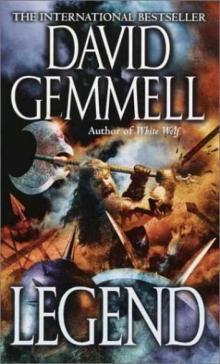 Drenai Saga 01 - Legend
Drenai Saga 01 - Legend White Knight/Black Swan
White Knight/Black Swan![[Troy 02] - Shield of Thunder Read online](http://i1.bookreadfree.com/i/03/19/troy_02_-_shield_of_thunder_preview.jpg) [Troy 02] - Shield of Thunder
[Troy 02] - Shield of Thunder Lord of the Silver Bow t-1
Lord of the Silver Bow t-1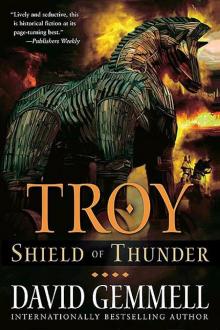 Shield of Thunder t-2
Shield of Thunder t-2 White Wolf: A Novel of Druss the Legend dt-10
White Wolf: A Novel of Druss the Legend dt-10 Drenai Saga 02 - The King Beyond the Gate
Drenai Saga 02 - The King Beyond the Gate Ironhand's Daughter
Ironhand's Daughter Gemmell, David - Drenai 06 - The First Chronicles of Druss the Legend
Gemmell, David - Drenai 06 - The First Chronicles of Druss the Legend The Last Guardian
The Last Guardian Hero in the Shadows: A Waylander the Slayer Novel
Hero in the Shadows: A Waylander the Slayer Novel The Legend of the Deathwalker
The Legend of the Deathwalker